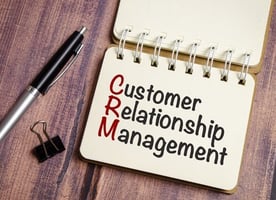A modern CRM system serves as the central nervous system for managing interactions and data related...
Choosing Your Startup's First CRM: A Guide to Smart Growth
You're a startup founder, juggling a million things. Customers are coming in, leads are piling up, and you're realizing spreadsheets just aren't cutting it anymore. Sound familiar?
A Customer Relationship Management (CRM) system isn't just for big corporations. For startups, it's a critical tool for scaling, building relationships, and ultimately, driving revenue. There is also an other point to consider: at every stage, you will have to persuade potential and existing investors that you are organized, always seeking for optimization and that you are using the best tools and apps!Why Startups Really Need a CRM
Let's be realistic, startups aren't swimming in resources. Every minute and every dollar counts. As a startuper, you would not buy CRM if it was a 'nice-to-have' tool. But the reality is that a CRM is a survival tool for most startups, it is about preventing chaos before it hits! You're trying to build something from scratch, and in those early days, you're wearing every hat. You're the CEO, salesperson, and customer support all rolled into one. Without a centralized system, you'll inevitably drop balls. Crucial customer details will get lost in email chains, follow-ups will slip through the cracks, and potential deals may be lost. A CRM acts as your external brain, keeping track of everything so you can focus on building your product and finding product market fit. It's about maximizing your limited bandwidth and resources."
Think of it this way: your early customers and partners are your evangelists. You need to nurture those relationships like gold. A CRM allows you to personalize interactions, understand their pain points, and anticipate their needs. This isn't just about closing deals; it's about building a loyal customer base that will spread the word about your startup. In the beginning, you're often operating on gut feeling and intuition. But as you scale, you need data to validate your assumptions. A CRM provides the insights you need to understand what's working and what's not. Is your sales cycle too long? Are you losing leads at a specific stage? Are certain customer segments more profitable than others? A CRM answers these questions, allowing you to iterate and optimize your strategies. It's not about having a fancy dashboard; it's about making informed decisions that drive sustainable growth, because in a startup, every decision has a massive impact.
Furthermore, a well-implemented CRM signals to potential and existing investors that you're serious about organization and growth. It demonstrates that you're not just throwing spaghetti at the wall, but rather building a structured, data-driven company, relying on best practices and using the appropriate tools. This level of organization can be a crucial factor in securing funding and fostering investor confidence.
Essential CRM Features for Startups
Affordability & cost allocation
For startups, 'affordability' is a nuanced concept. It's not solely about the sticker price, but rather how that cost impacts your fragile cash flow. Large, upfront expenses are a major hurdle when you're bootstrapping. This is why flexible, subscription-based pricing is crucial. Look for CRMs that offer monthly or annual payment options, allowing you to spread costs and align them with your revenue cycle.
A particularly valuable option for startups is the 'pay-per-seat' model. This structure allows you to pay only for the number of users actively utilizing the CRM. In the early stages, when your team is small and potentially fluctuating, this can significantly reduce costs compared to fixed-price plans. As your team grows, you can easily add more seats without incurring a massive, immediate expense. Consider this: instead of a large annual fee for a set number of users, you pay a smaller monthly fee for each active team member. This provides predictability and control over your expenses, allowing you to allocate resources more effectively. You can easily adjust your spending based on your team's size and needs, making it ideal for the dynamic nature of startup growth.
When evaluating CRM pricing, carefully analyze the different tiers and features offered. Some CRMs may offer a lower initial price but charge extra for essential features like reporting, integrations, or customer support. Opt for a plan that provides the core functionalities you need without unnecessary add-ons. Don't be afraid to negotiate or ask about startup discounts, as many CRM providers are willing to work with early-stage companies. The key is to find a solution that balances affordability with the essential features you need to drive growth, without jeopardizing your precious cash flow.
Integration with Critical Tools
While broad integration capabilities might seem attractive, startups must prioritize integrations that directly align with their core operations. In most cases, a reliable email and calendar integration will suffice. However, certain industries rely on specialized tools, making CRM integration essential for streamlined workflows and data consistency.
IoT (Internet of Things) Related Businesses
Startups developing IoT solutions often need to integrate their CRM with platforms that manage device data, sensor readings, and network connectivity. For example, a company providing smart agriculture solutions would need its CRM to integrate with IoT platforms that collect data on soil moisture, temperature, and crop health. This integration allows sales and support teams to access real-time device data, providing personalized customer service and targeted sales pitches based on actual usage patterns. Also, if there is a platform where the devices are managed, the CRM has to be able to get the data from there.
Scientific Operations:
Startups involved in scientific research or biotechnology often rely on specialized laboratory information management systems (LIMS) or electronic lab notebooks (ELNs). Integrating the CRM with these systems allows researchers and sales teams to track customer interactions, project progress, and research data in a unified platform. For example, a startup developing new pharmaceutical compounds would need to integrate its CRM with its LIMS to track customer feedback on clinical trials and manage relationships with research partners.
Financial Services
Fintech startups or financial advisors often require integration with financial data providers, trading platforms, or compliance software. For example, a robo-advisor startup would need its CRM to integrate with market data feeds and portfolio management tools to provide personalized investment advice to clients. Also, a company that provides loans must integrate with the credit checking and loan management software that they use. Compliance software integration is also essential for companies that must adhere to strict regulatory requirements.
E-commerce with specific needs
While most e-commerce businesses will need a general integration with their store platform, some have very specific needs. For example, a company that sells personalized, made to order goods, might need an integration with their manufacturing software, so that the CRM can track the production process of a specific customer order.
In these instances, CRM integration isn't just a convenience; it's a necessity for efficient operations and data-driven decision-making. These examples, however, are not exhaustive. Many other industries and specialized businesses have unique integration needs. Before selecting a CRM, startups must thoroughly assess their specific operational requirements and carefully evaluate its integration capabilities, ensuring compatibility with their critical tools. It is crucial to remember that the specific needs of a startup is the most important factor to consider.
Brand Recognition and Perception (Investor and Talent Attraction):
"In the startup world, perception matters. Choosing a well-known, reputable CRM brand can send a powerful message to investors and potential employees. Using a recognized CRM system demonstrates that you're committed to using industry-standard tools and best practices. This can bolster investor confidence, signaling that you're building a professional and scalable business. Moreover, it can attract top talent who are familiar with and expect to use leading CRM platforms. A well-known CRM can act as a subtle but effective indicator of your startup's commitment to quality and growth.
Customer support
Startups need CRM providers that offer responsive and accessible support channels, whether it's through live chat, email, or phone. Look for providers with a proven track record of resolving issues quickly and efficiently. Time is a critical asset, and a CRM provider that understands this will be invaluable. Don't underestimate the importance of testing their support responsiveness during a free trial. Send a few test inquiries and see how quickly and thoroughly they respond. Excellent support can be the difference between a smooth implementation and a frustrating, time-consuming ordeal."
Beyond direct support, comprehensive user manuals and documentation are essential for startups. User-friendly and well-organized manuals allow your team to quickly learn the ins and outs of the CRM, minimizing downtime and maximizing productivity. Startups often have limited training resources, so self-serve learning materials are crucial. Look for CRMs with detailed knowledge bases, video tutorials, and step-by-step guides. These resources empower your team to troubleshoot issues independently and discover new features without relying solely on external support. The ability to find answers quickly and efficiently is a major time-saver for startups with tight schedules and limited personnel. A good user manual is a sign that the CRM provider cares about the user experience.
Finally, a vibrant community of users can be a significant asset for startups. A thriving user community provides a platform for sharing best practices, troubleshooting problems, and discovering innovative ways to use the CRM. Forums, online groups, and social media channels can offer valuable insights and support from fellow users who have faced similar challenges. For startups, this peer-to-peer support can be invaluable, especially when dealing with unique or industry-specific issues. A strong community also indicates that the CRM provider is actively engaged with its users and committed to continuous improvement. It shows a commitment to the product that goes beyond just selling software. When choosing a CRM, investigate the size and activity of its user community. A robust community can provide a wealth of knowledge and support, helping your startup get the most out of its CRM investment.
Data Protection and Regulatory Compliance
In today's regulatory landscape, data protection is non-negotiable. Startups must prioritize CRMs that demonstrate a strong commitment to data security and compliance with relevant regulations. This is especially critical for businesses operating in or serving customers in Europe and California, which have some of the most stringent data protection laws in the world.
GDPR (General Data Protection Regulation) Compliance
For startups dealing with European customers, GDPR compliance is mandatory. Look for CRMs that offer features such as data encryption, access controls, and the ability to fulfill data subject requests (e.g., right to access, right to erasure). Ensure the CRM provider has clear data processing agreements in place and can demonstrate their commitment to protecting personal data.
CCPA/CPRA (California Consumer Privacy Act/California Privacy Rights Act) Compliance
Similarly, startups serving Californian customers must comply with CCPA/CPRA. This legislation grants consumers significant rights over their personal information, including the right to know, the right to delete, and the right to opt-out of sales. Verify that the CRM allows you to manage consumer requests and provides the necessary tools for compliance.
General Data Security
Beyond specific regulations, prioritize CRMs that offer robust security features, such as data encryption at rest and in transit, regular security audits, and strong access controls. A CRM provider's commitment to data security should be transparent and well-documented. Startups should ask about the CRM providers security certifications.
Data breaches can have devastating consequences for startups, damaging their reputation and incurring significant financial penalties. Choosing a CRM that prioritizes data protection is not just a matter of compliance; it's a matter of building trust with your customers and ensuring the long-term sustainability of your business.
Our choice: HubSpot CRM for startups
When recommending a CRM for startups, we lean towards HubSpot CRM. We suggest HubSpot's Starter Bundle that offers a powerful foundation, allowing startups to get started without a significant upfront investment, starting from 15€ per month. The pay-per-seat model in their paid tiers ensures scalability and cost-effectiveness as the team grows. HubSpot's intuitive interface and comprehensive user manuals make it easy to learn and implement, minimizing onboarding time. Its robust integration capabilities, particularly with other HubSpot tools and popular marketing platforms, streamline workflows. Furthermore, HubSpot's strong brand recognition and commitment to data protection, including GDPR and CCPA/CPRA compliance, provide peace of mind. Their community forums and knowledge base are also very helpful.
Furthermore, HubSpots Starter Bundle offers a compelling advantage for startups by including a modern webisite platform (CMS) together with its powerfull CRM, at the same pricing plan. For a lean startup team, this 'all-in-one' approach dramatically simplifies everything . Instead of wrestling with complex integrations between a standalone CRM and a separate website builder or marketing platform, HubSpot seamlessly connects your customer interactions with your website content, landing pages, and blog. This not only saves precious time and resources spent on managing disparate systems but also ensures a consistent brand experience across all customer touchpoints. This unified ecosystem allows startups to track the entire customer journey from website visitor to loyal advocate, making data-driven decisions easier and accelerating growth without the usual integration headaches.
Conclusion
In the dynamic and often chaotic world of startups, a Customer Relationship Management (CRM) system is far from an optional luxury; it's a critical tool for survival and growth. To choose the right CRM, startups must prioritize affordability with flexible payment structures like pay-per-seat, focus on essential integrations rather than broad ones, consider brand recognition for investor and talent attraction, and ensure robust data protection and compliance. Beyond the software itself, reliable customer support, comprehensive user manuals, and an active user community are essential for maximizing the CRM's potential.
Choosing the right CRM is a significant step towards building a sustainable and scalable business. If you're looking for expert guidance in selecting and implementing the perfect CRM for your startup, we're here to help. Visit our HubSpot service page to learn more about our tailored CRM consulting services and how we can help you unlock your startup's full potential.



